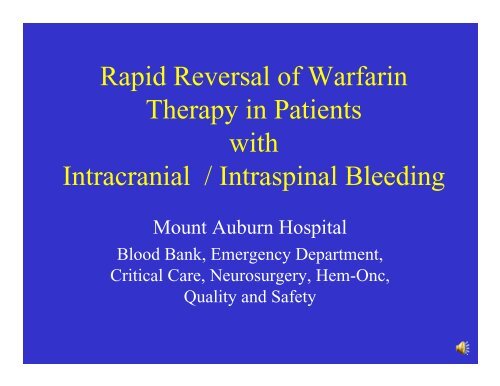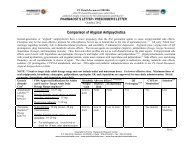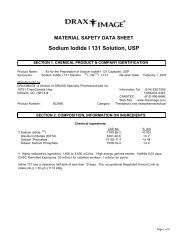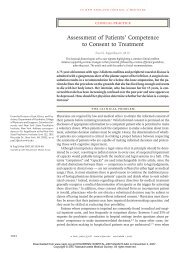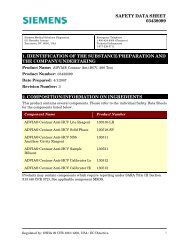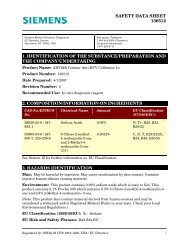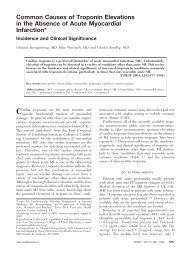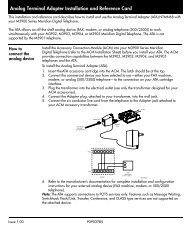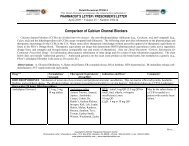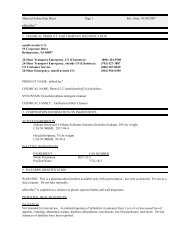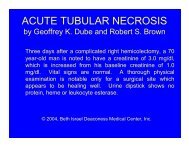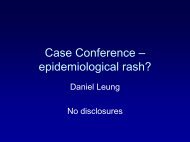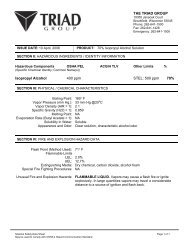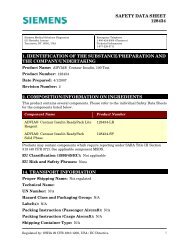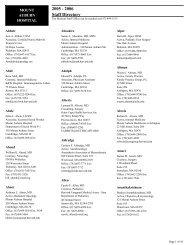Warfarin Reversal Education NAR - (PDF for slower connections)
Warfarin Reversal Education NAR - (PDF for slower connections)
Warfarin Reversal Education NAR - (PDF for slower connections)
Create successful ePaper yourself
Turn your PDF publications into a flip-book with our unique Google optimized e-Paper software.
Rapid <strong>Reversal</strong> of <strong>Warfarin</strong><br />
Therapy in Patients<br />
with<br />
Intracranial / Intraspinal Bleeding<br />
Mount Auburn Hospital<br />
Blood Bank, Emergency Department,<br />
Critical Care, Neurosurgery, Hem-Onc,<br />
Quality and Safety
Clinical Questions<br />
• What are the treatment options <strong>for</strong><br />
anticoagulation reversal<br />
• How fast do they work<br />
• What are the risk factors<br />
• What is the Rapid <strong>Reversal</strong> of <strong>Warfarin</strong><br />
Order-Set
Background<br />
• Life threatening bleeds in patients on wafarin -<br />
Timely reversal is IMPERATIVE!<br />
• Current Treatment Options:<br />
– FFP<br />
• Concerns: Delayed treatment (thaw time), volume<br />
overload, inadequate correction<br />
– Vitamin K IV<br />
• Concerns: Length of onset time<br />
– Prothrombin Complex Concentrate (PCC)<br />
– Desmopressin (DDAVP)<br />
• Increases levels of VWF and factor VIII
Evidence <strong>for</strong> Use of PCC
Evidence continued
Main Points:<br />
• PCC normalizes INR faster than FFP<br />
• PCC is recommended <strong>for</strong> patients with life-threatening<br />
warfarin related bleeding<br />
• PCC, vitamin K IV, and FFP should all be available <strong>for</strong> this<br />
patient population
PCC: What is it<br />
• Also called: Bebulin (the brand name)<br />
• Factor IX complex concentrate and has high<br />
levels of factor II, IX and X (vit K<br />
dependent coag. Factors)<br />
• Low level of factor VII<br />
• Works by temporarily raising the levels of<br />
these clotting factors<br />
• AHA / ASA class IIb recommendation<br />
• Cost: $1500 / dose ($1 / IU)
PCC: Adverse Reactions<br />
• Allergic reaction<br />
• Chills, headache, fever, nausea and<br />
vomiting, rash tx with antihistamines<br />
– Anaphylactic reaction tx immediately<br />
• Thrombosis (small risk factor)
Rapid <strong>Reversal</strong> of <strong>Warfarin</strong><br />
Order-set<br />
• Restricted to the ED, Critical Care, and OR<br />
• Indications: Confirmed CT with<br />
Intracranial or Intraspinal hemorrhage with<br />
elevated INR<br />
•Exclusions: HIT in previous 3 months<br />
• Relative contraindications:<br />
– DIC, history of recent thrombosis, MI,<br />
Ischemic Stroke
Initial Work-up<br />
• STAT head CT<br />
• Once Head CT confirmed:<br />
– Notify/ CALL blood bank and core lab<br />
– Blood bank x 5096<br />
– Core Lab x 5060<br />
• Neurosurgical Emergency: Patient Name, and MR #<br />
– All labs need to be handed to a lab tech<br />
• STAT PT/INR, PTT, D-dimer, fibrinogen, CBC, in a<br />
bag labeled STAT to core lab<br />
• STAT type and screen to blood bank<br />
• STAT BMP and LFTs
Next Steps (per order-set)<br />
1) Immediately Administer Vitamin K 10 mg<br />
slow IV infusion<br />
2) Administer PCC (Bebulin)<br />
– INR < 5 20ml Bebulin IV (~ 500 IU)<br />
– INR > 5 40ml Bebulin IV (~ 1000 IU)<br />
– Rate: Do not exceed 2 ml per minute IV<br />
3) 2 units FFP given<br />
4) Consider Plt if Plt < 100,000<br />
5) Consider DDAVP (Desmopressin) - If plt<br />
dysfunction present
Post Initial PCC infusion<br />
• Follow up Labs: 10 - 15 min AFTER PCC<br />
infusion is complete: STAT PT / INR<br />
•Goal: Normalization of INR with in<br />
shortest time possible<br />
• Further management: Per attending MD<br />
• Additional labs may be needed per the<br />
pathologist or MD<br />
• Maximum I.U. per Medical Director of<br />
blood bank (~ 3000 IU maximum)
Case Study<br />
• 71 yo M with sudden onset of a severe<br />
headache and blurred vision<br />
• Vitals: BP 200/90, HR 92, RR 14, Temp 98<br />
• PMH: Afib, CAD, HTN, diabetes<br />
• Medications:<br />
– <strong>Warfarin</strong> 5mg daily<br />
– Lopressor 25mg BID<br />
– Lipitor 20mg daily<br />
– Glucaphage 10mg BID
Case Study Continuted<br />
• Head CT shows ICH<br />
•Next Steps
Conclusions<br />
• Coagulopathy puts patients at high risk <strong>for</strong><br />
ICH<br />
• Vitamin K<br />
– Effective, but slow onset<br />
• FFP<br />
– Effective, but slow and risk of volume overload<br />
• PCC - is effective and fast acting<br />
– Order - set is available now<br />
• When given together Vit. K, FFP, and PCC<br />
can quickly normalize INR
References<br />
• Chest 2008; 133 (6Suppl): 160S - 198S<br />
• Stroke 2007; 38; 2001 - 2023<br />
• Yasaka M et al; Optimal dose of PCC <strong>for</strong><br />
acute reversal of oral anticoagulation.<br />
Thromb Res. 2005; 115; 455 - 459<br />
• Nat’l Advisory Committee on Blood and<br />
Blood Products, September 2008


